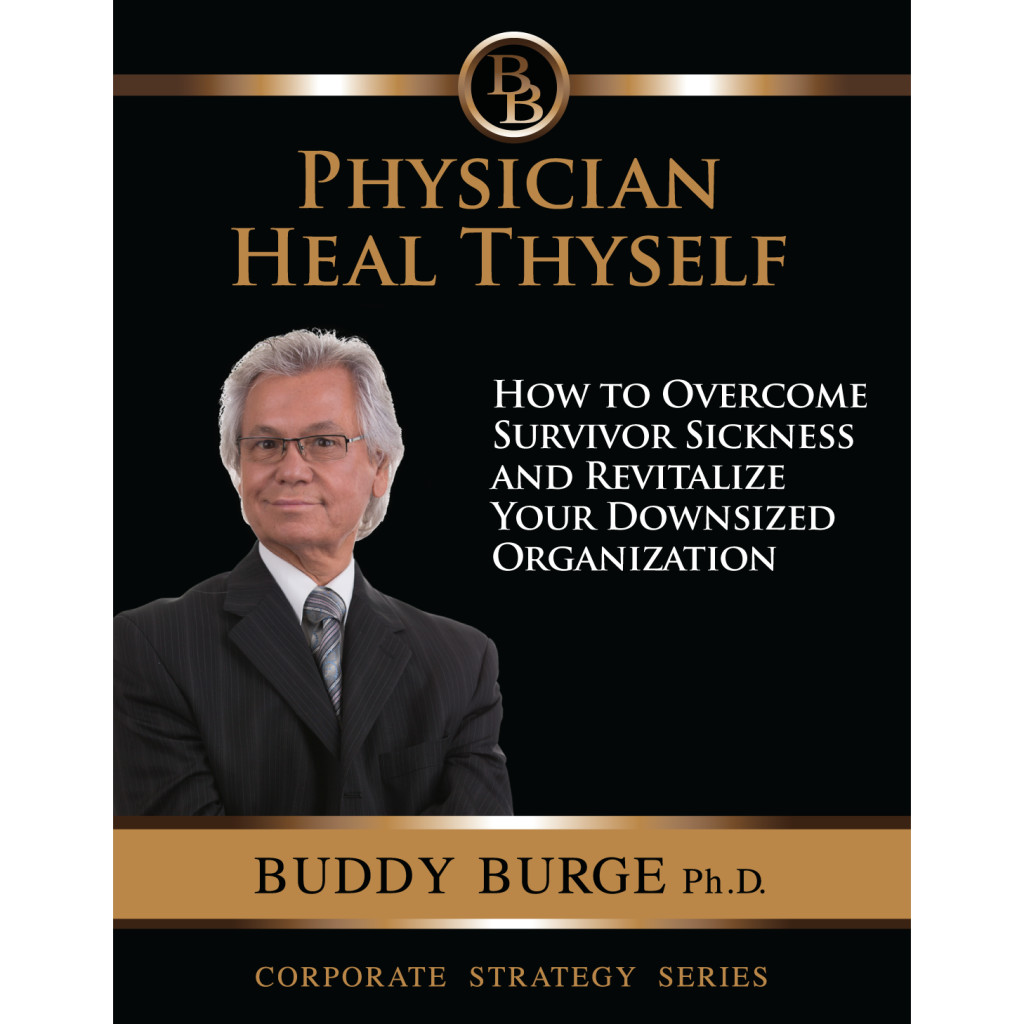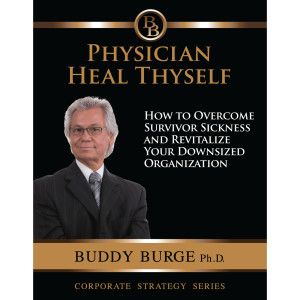
This excerpt is taken from “Physician, Heal Thyself”
The Four Step Intervention Process for Survivor Sickness
Layoff Survivor Sickness is Serious.
It is complex and does not lend itself to a simple solution.
It forces us to choose either organizational codependency or self-empowerment.
To be cured of it, people must let go of the familiar old, and venture into the untested new.
Healing layoff survivor sickness is, in the final analysis, an individual effort, requiring great personal courage.
Creating organizational systems that will prevent the reoccurrence of this sickness ought to be one of the most fundamental priorities of organizational leaders.
Only compelling interventions can deal with the pathology of layoff survivor sickness.
Survivor Grief: Four Step Intervention Process
The Four Interventions Are:
Level One: Process Interventions
Level Two: Grieving Interventions
Level Three: Interventions that Break Organizational Co-dependency
Level Four: Systems Interventions
Level One: Process Interventions
Level One interventions deal with the layoff process.
They represent the way layoffs take place from the survivors’ perspective.
These interventions do not provide a cure for survivor sickness, but keep survivors from sinking further into survivor symptoms.
Level Two: Grieving Interventions
Level Two interventions help survivors grieve.
These interventions deal with repressed feelings and emotions and provide the opportunity for a catharsis that releases the energy that has been invested in emotional repression.
Level Three: Interventions that Break Organizational Co-dependency
Level Three interventions help survivors recapture from the organization their sense of control and self-esteem.
Level Four: Systems Interventions
Level Four interventions create the structural systems and processes that immunize people against survivor sickness.
Note: In this program we will explore and explicate the rather difficult and pressing interventions One and Two.
These, of course, are the initial stages of recovery and address more immediate concerns…
Intervention Three and Four, the more Systemic Interventions can be found and will be outlined, detailed and addressed in workshops Two, Four, Five, Six and Nine in this series:
Get Unstuck, Stay Unstuck and Do What You Are
Why People do what they do in Your Organization and What to Do About it
How to Make Sure Lean and Mean Doesn’t Mean Sad and Angry
Restructuring and layoffs are intended to reduce costs and promote an efficient, lean and mean organization.
However, what tends to result is a sad and angry organization, populated by depressed survivors.
A Few Rules of Thumb
1. The greater the trust, the greater the sense of violation.
2. The higher the sense of violation, the greater their susceptibility to survivor sickness.
3. The higher a person resides in an organization, the more he or she will be invested in denying the symptoms of the sickness.
4. Understanding and dealing with survivor sickness require personal vulnerability and knowledge of its symptoms.
5. The management job in a downsized organization is extremely complex and demanding.
6. Confronting denial head-on only serves to reinforce it.
7. It is usually better to help people legitimize their emotions by dealing with them indirectly or allegorizing them.
Metaphor of the Surviving Children
Imagine a family: a father, a mother, and four children.
The family had been together for a long time, living in a loving, nurturing and trusting environment.
The parents take care of the children, who reciprocate by being good.
Every morning the family breakfasts together, a ritual that functions as a bonding experience, somewhat akin to an organizational staff meeting.
One morning, the Children Sense that Something is Wrong
The parent’s exchange furtive glances appear nervous, and after a painful silence, the mother speaks.
“Father and I have reviewed the family budget,” she says, looking down at her plate, avoiding eye contact, “and we just don‘t have enough money to make ends meet.
She forces herself to look around the table and continues, “As much as we would like to, we just can’t afford to feed and clothe all four of you.
After another silence she points a finger.
“You two must go.”
“It’s nothing personal,” explains the father as he passes out a sheet of paper to each of the children.
“As you can see by the numbers in front of you, it’s simply an economic decision–we really have no choice.
We have arranged for your aunt and uncle to help you get settled, to aid in your transition”.
The next morning, two chairs have been removed.
All physical evidence of the other two children has vanished.
The emotional evidence is suppressed and ignored.
No One Talks About the two who have Disappeared
The parents emphasize to the two remaining children, the survivors that they should be grateful, since after all, you’ve been allowed to remain in the family.
To show their gratitude, the remaining children will be expected to work harder on the family chores.
The father explains that “the workload remains the same even though there are two less of you”.
The mother reassures them that “this will make us a closer family”.
“Eat your breakfast,” entreats the father.
“After all, food costs money.”
Metaphor of Surviving Children Exercise:
Form small groups and discuss your answers to the following:
1. What were the children who left feeling?
2. What were the children who remained feeling?
3. What were the parents feeling?
4. How different are these feelings from those of survivors in your organization?
5. How productive is a work force with these survivor feelings?
6. What are the similarities to or lessons for our group from this metaphor?
For more on this topic, we recommend the following | |
 | Physician, Heal ThyselfHow to Overcome Survivor Sickness and Click Here For Video and Full Description If you found this article useful |

![CropperCapture[182]](http://buddyburge.com/wp-content/uploads/2014/02/CropperCapture1821-300x249.png)
![CropperCapture[183]](http://buddyburge.com/wp-content/uploads/2014/02/CropperCapture183-1024x652.png)
![CropperCapture[184]](http://buddyburge.com/wp-content/uploads/2014/02/CropperCapture1841-300x224.png)
![CropperCapture[185]](http://buddyburge.com/wp-content/uploads/2014/02/CropperCapture1851-300x213.png)
![CropperCapture[186]](http://buddyburge.com/wp-content/uploads/2014/02/CropperCapture1861-300x243.png)
![CropperCapture[187]](http://buddyburge.com/wp-content/uploads/2014/02/CropperCapture1871-300x279.png)
![CropperCapture[188]](http://buddyburge.com/wp-content/uploads/2014/02/CropperCapture1881-280x300.png)
![CropperCapture[189]](http://buddyburge.com/wp-content/uploads/2014/02/CropperCapture1891-300x268.png)
![CropperCapture[190]](http://buddyburge.com/wp-content/uploads/2014/02/CropperCapture1901-300x242.png)
![CropperCapture[191]](http://buddyburge.com/wp-content/uploads/2014/02/CropperCapture1911-300x197.png)
